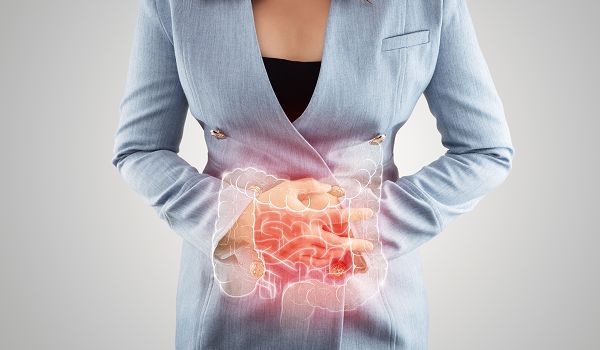What are actually
chronic inflammatory bowel disease?
Chronic inflammatory bowel diseases (IBD) are long-term diseases of the digestive tract. The disease typically progresses in phases, with periods of symptoms and periods of rest. Crohn’s disease and ulcerative colitis are the two main forms of IBD, which differ both in terms of symptoms and the sections of the intestine affected.
IBD can affect people of any age, but often occurs for the first time in young adulthood. Due to its protracted nature, IBD can have a significant impact on the daily lives of those affected.
About the symptoms
More information
Important information on chronic inflammatory bowel diseases
Symptoms of IBD:
- Abdominal pain and cramps
- Persistent diarrhea, possibly also bloody stool
- Weight loss
- Reduced appetite and nausea
- Tiredness and exhaustion
- Impairment of quality of life and everyday activities
What consequences can a chronic course of IBD have?
A chronic course of inflammatory bowel disease can lead to a number of long-term consequences. These include loss of bowel function, narrowing of the bowel (stenosis), unnatural connections between organs (fistulas), an increased risk of bowel tumors and inflammation outside the gastrointestinal tract, which can affect the joints, skin, liver or eyes.
These consequences can affect the quality of life and require careful treatment and care to avoid complications and improve the patient's well-being
What are the causes of chronic inflammatory bowel disease?
With CED the exact causes are not yet fully understood. It is assumed that a complex interaction of different risk factorsfactors play a rolethat the disease is more likely to occur.
Genetic predisposition
Genetic predisposition
Family members CED, occurrence of certain gene variants
Impaired regulation of the immune system
Impaired regulation of the immune system
Excessive reaction to the intestinal tract, intestine is regarded as an "intruder" by the immune system
Relevant environmental factors
Relevant environmental factors
e.g. smoking, poor diet, certain medications, infections, environmental pollution
Disturbed balance in the intestinal microbiome (intestinal flora)
Disturbed balance in the intestinal microbiome (intestinal flora)
Intestinal microorganisms in imbalance, e.g. due to the intake of e.g. antibiotics
Long-lasting inflammatory reactions
Long-lasting inflammatory reactions
Further inflammatory reactions due to existing tissue damage
How are chronic inflammatory bowel diseases diagnosed?
The gastroenterologist will first take a detailed medical history and ask about symptoms such as persistent diarrhea, abdominal pain, weight loss and bloody stools. A thorough physical examination can help to detect signs of inflammation or other problems in the digestive tract.
This includes the following examinations:
Blood tests
Various blood tests are carried out to check certain markers in the blood. These can indicate inflammation, anemia, infections or deficiencies. Examples of such tests are the C-reactive protein (CRP) test, the sedimentation rate (BSG) test and blood count tests.
Stool examination
A stool sample can be examined for signs of infection, inflammation or bleeding. This can help to rule out other causes for the symptoms.
Imaging procedures and biopsy
Examinations such as an endoscopy or colonoscopy can be carried out to examine the bowel directly. A flexible tube with a camera is inserted into the intestine to assess the condition of the intestinal mucosa and take tissue samples (biopsies). These samples are then examined microscopically to confirm inflammatory changes or other abnormalities and to differentiate between Crohn's disease and ulcerative colitis or other forms. Other imaging techniques such as ultrasound, CT scan or MRI can be used to assess the condition of the digestive tract more accurately.
Various blood tests are carried out to check certain markers in the blood. These can indicate inflammation, anemia, infections or deficiencies. Examples of such tests are the C-reactive protein (CRP) test, the sedimentation rate (BSG) test and blood count tests.
A stool sample can be examined for signs of infection, inflammation or bleeding. This can help to rule out other causes for the symptoms.
Examinations such as an endoscopy or colonoscopy can be carried out to examine the bowel directly. A flexible tube with a camera is inserted into the intestine to assess the condition of the intestinal mucosa and take tissue samples (biopsies). These samples are then examined microscopically to confirm inflammatory changes or other abnormalities and to differentiate between Crohn's disease and ulcerative colitis or other forms. Other imaging techniques such as ultrasound, CT scan or MRI can be used to assess the condition of the digestive tract more accurately.
Sources
Please note that all content provided regarding individual medical conditions, treatments, procedures, etc. is general information and may vary depending on the physician:in and individual case and initial situation.
For more detailed information, please always consult your doctor.
What should I do if I have chronic inflammatory bowel disease?
Dietary changes
It can be helpful to identify and avoid trigger foods that could exacerbate symptoms. A balanced diet with high-fiber foods, sufficient fluid intake and the consumption of well-tolerated, nutrient-rich foods can help to soothe the intestines and promote healthy digestion.
Stress management and emotional well-being
Implementing stress management techniques such as relaxation exercises, meditation, regular physical activity and adequate sleep can help to reduce stress levels and improve emotional well-being. Dealing with IBD can also be emotionally stressful, so talking to other sufferers, involving support systems and participating in self-help groups can be helpful.
Regular medical care and monitoring
Regular medical care is important in order to monitor the progression of IBD, detect complications at an early stage and adapt individual treatment plans. Medical treatments such as anti-inflammatory drugs, immunosuppressants and biologics aim to control inflammation and relieve symptoms. In some cases, surgical interventions may also be necessary. Discuss the treatment options with an experienced gastroenterologist for optimal care.
